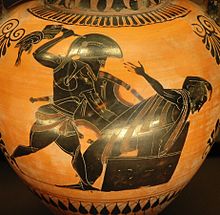Priam
Priamos ( ancient Greek Πρίαμος Príamos , lesbian Πέρραμος Pérramos , Latinized Priamus , Germanized Priam ) is the son of Laomedon and Strymo (Plakia, daughter of Otreus). In Greek mythology he was the sixth and last king of Troy (Ilios) during the Trojan War described by Homer .
Name and story
According to ancient etymology, its name comes from the (ancient Greek or Lydian ) word πρίασθαι priasthai ('buy'). According to the legend, he got this name because his sister Hesione bought him free when the city was stormed by Heracles , who had been betrayed by his father and then King Laomedon. Before that he is said to have been called Podarkes ( Ποδάρκης , 'the quick- footed ').
His (half) brothers are Tithonos , Lampo, Klytios, Hiketaon, and the (half) sisters Hesione , Killa and Astyoche .
Homer also reported that, as a young man, Priam supported Phrygians who had settled on the Sangarios in battle when they were attacked by Amazons .
He did not take part in the battle for Troy because of his age. In Homer's Iliad he emerges as an old man through his nightly walk to the Greek ship camp, where he asks Achilles for the violated corpse of his son Hector and finally receives it.
During the conquest of Troy, Priam is said to have been killed by Neoptolemus (in Virgil : Pyrrhus ), son of Achilles, at the altar of Zeus in front of his relatives. Later poems based on Homer portray the events differently: After storming the city of Troy, Priam armed himself and wanted to throw himself into the hostile crowd. But Hecabe begged him to flee, which is why he flees with her and his daughters to the altar of Zeus Herkeios. Here he saw how his son Polites was killed by Pyrrhus, and "sent his projectile against this, but found his death by it".
Marriage and offspring
Priam's first wife is said to have been Arisbe , daughter of Merops , with whom he begat Aisakos . He then married Hekabe (also spelled Hecuba ; daughter of the Phrygian king Dymas) and fathered a total of 19 children with her, including Hector , Krëusa , Helenos , Antiphos , Polites , Laodike , Paris , Kassandra , Polydoros , Polyxena , Troilos , Agathon , Deiphobos .
Other wives and descendants of Priam according to traditional myths:
- from Laothoe (daughter of the Legian king Altes): Lykaon
- from Kastianeira from Aisyme : Gorgythion
- from other partly unknown women:
- Sons Melanippos, Philaimon, Hippothous , Glaucus , Chersidamas, Evagoras, Hippodamas , Mestor , Atas, Doryklous, Dryops , bias , Chromios , Astygonos, Telestas , Evander, Kebriones , Mylios, Ark Machos, Laodokos, Echephron , Idomeneus, Hyperion, Askanios , Demokoon, Aretos , Deioptes, Klonios , Echemon, Hypiochos, Aigeoneus, Lysithous, Polymedon, Isos, Pammon, Antiphonos, Dios
- Daughters: Medusa , Medesicaste, Lysimache , Aristodeme
He and all of his wives and concubines are said to have had well over 50 children, almost all of whom died or died in the war for Troy.
Namesake
After Priam, Heinrich Schliemann named the “ treasure of Priam ” in 1872 , which he discovered during excavations in the ruins of Troy.
Priam in literature and art

literature
Priam appears in Homer's “ Iliad ” as well as in Virgil's “ Aeneid ” , as well as in numerous stories and plays about the Trojan War, right up to modern times.
Priam's complaint to Homer:
“ I wretched man! I made the bravest sons
far and wide in Troy, and now there is none left for me!
'I the son' had fifty when Argos' crowd marched along: of
their nineteen were born to a mother,
and the others I fathered in the palace with my sister. "
Priam in film and television (selection)
- 1956: The beautiful Helena , portrayed by Cedric Hardwicke
- 1985: King Priam portrayed by Rodney Macann
- 1997: The Adventures of Ulysses , played by Alan Smithie
- 2003: Helen of Troy , played by John Rhys-Davies
- 2004: Troy , played by Peter O'Toole
- 2018: Troy - fall of a city , portrayed by David Threlfall
literature
- Margaret Miller: Priam, King of Troy. In: JB Carter, SP Morris (Eds.): The Ages of Homer. Austin 1995, pp. 449-465.
- Paul Weizsäcker : Priam 1 . In: Wilhelm Heinrich Roscher (Hrsg.): Detailed lexicon of Greek and Roman mythology . Volume 3.2, Leipzig 1909, Col. 2936-2965 ( digitized version ).
